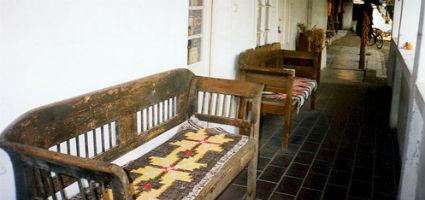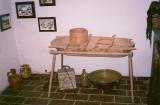2025. July 14. Monday
Szlovakian-Hungarian Region and Art House - Kondoros
 |
Address: 5553, Kondoros Ady Endre u. 12.
Phone number: (66) 388-160
E-mail: polhi@kondorosiktv.hu
Opening hours: Mon-Fri 7:30-12, 12:30-16
|
The Slovakian-Hungarian Region and Artist House was inaugurated on 20th August 1996. The collection material was collected by the local inhabitants in the 1970'ies, on the initiative of Mrs. Gyöngyösi, director of the Museum Lovers Club.
For several years the collection could be seen in the house next to the Geist-Csákó castle (a unique 4 flat anf 4 fireplace dwelling house with an open chimney) as a permanent exhibition; the building was run as a museum up to 1990, when it was broken into and robbed several times. At this time the remaining values were placed in boxes and waiting for their worthy place of protection.
The ethnographic material got to its present place through an agreement between the Slovakian Club of Kondoros, the members of the Rózsa Pávakör, former collectors, the leaders of the museum and the living members of the Museum Lover Club and the Faluszépítő Baráti Társaság (Village Improver Friendly Society). The building was built in 1926, owned by the Maczak family. Its present owner, the Faluszépítő Baráti Társaság (Village Improver Friendly Society) bought the building in its "modernized" form: its original state was restored by people of Kondoros, companies, societies, national firms, and the Minority Office of the Ministerial Institute.
For several years the collection could be seen in the house next to the Geist-Csákó castle (a unique 4 flat anf 4 fireplace dwelling house with an open chimney) as a permanent exhibition; the building was run as a museum up to 1990, when it was broken into and robbed several times. At this time the remaining values were placed in boxes and waiting for their worthy place of protection.
The ethnographic material got to its present place through an agreement between the Slovakian Club of Kondoros, the members of the Rózsa Pávakör, former collectors, the leaders of the museum and the living members of the Museum Lover Club and the Faluszépítő Baráti Társaság (Village Improver Friendly Society). The building was built in 1926, owned by the Maczak family. Its present owner, the Faluszépítő Baráti Társaság (Village Improver Friendly Society) bought the building in its "modernized" form: its original state was restored by people of Kondoros, companies, societies, national firms, and the Minority Office of the Ministerial Institute.
